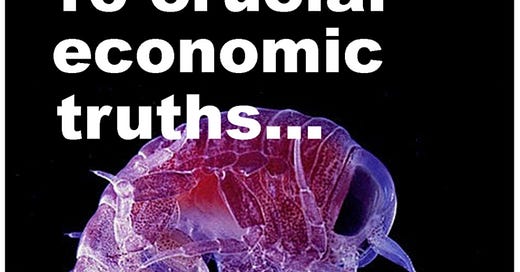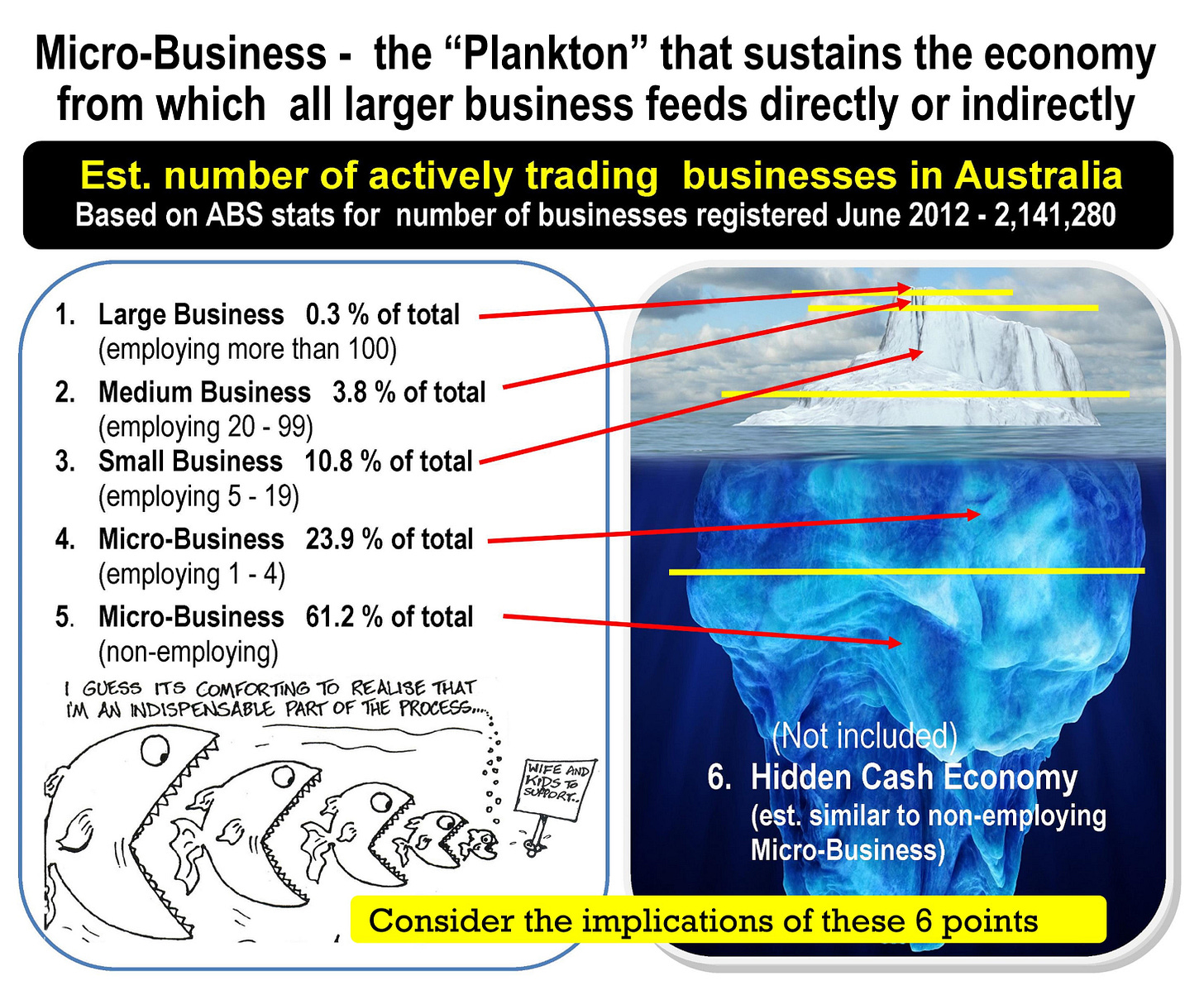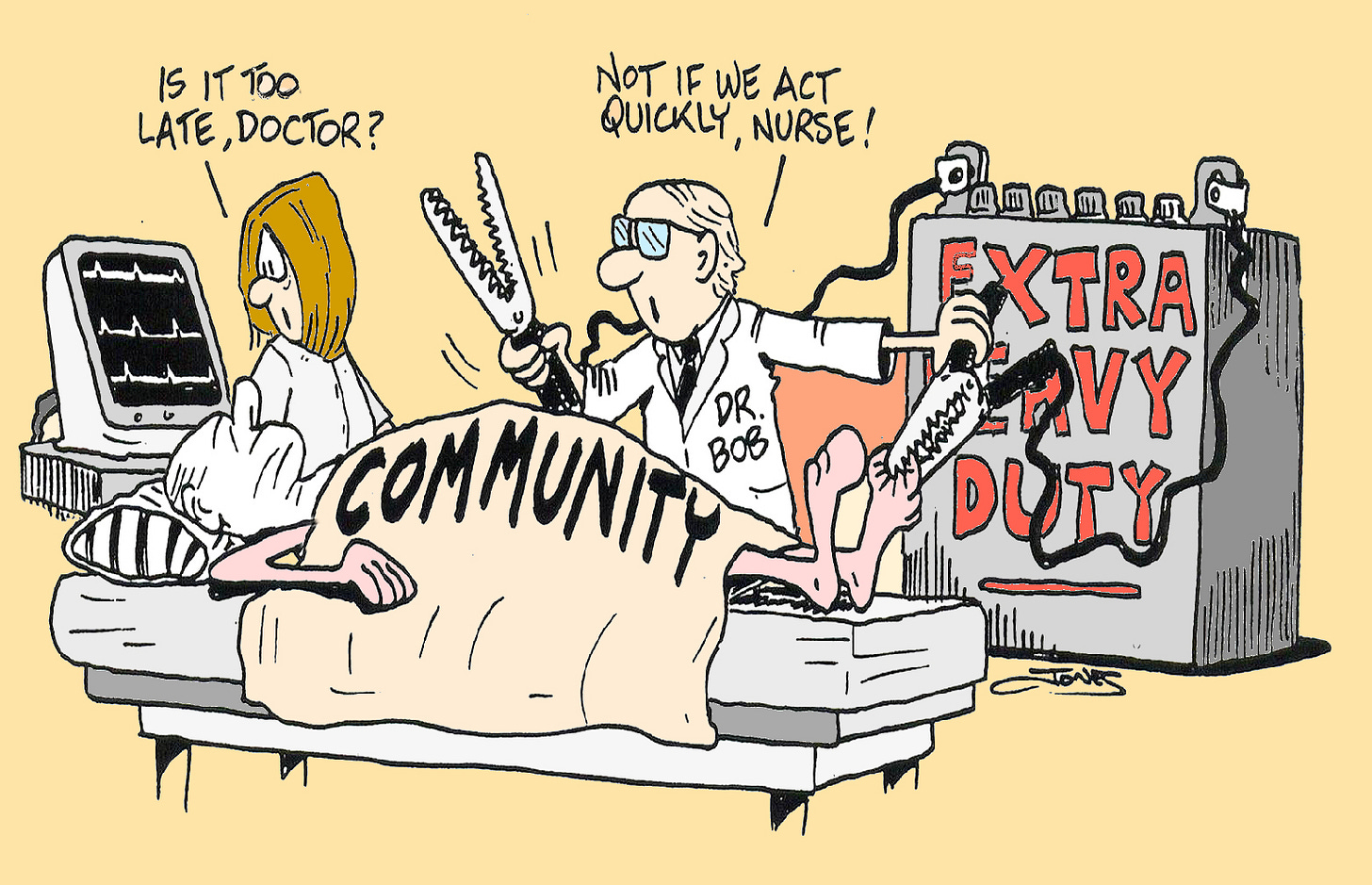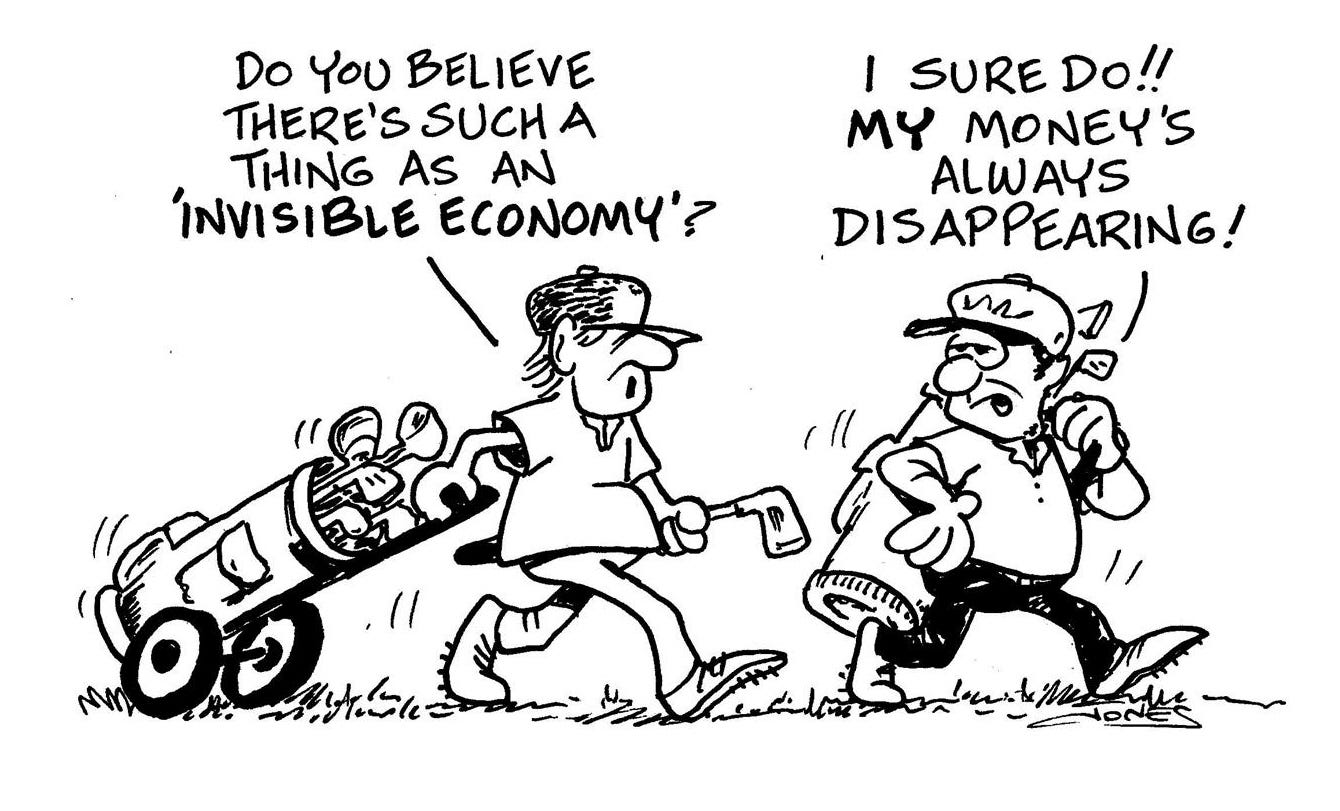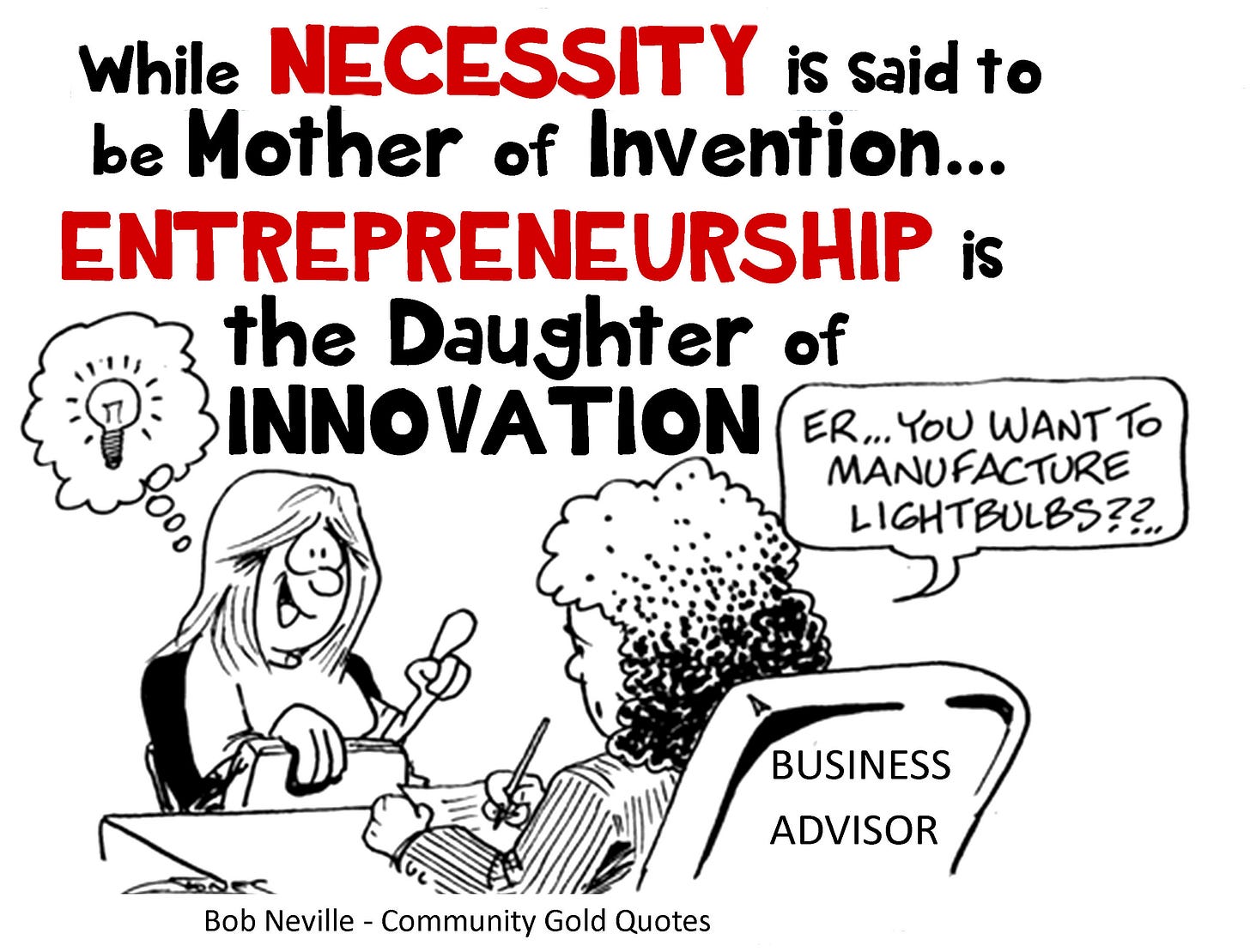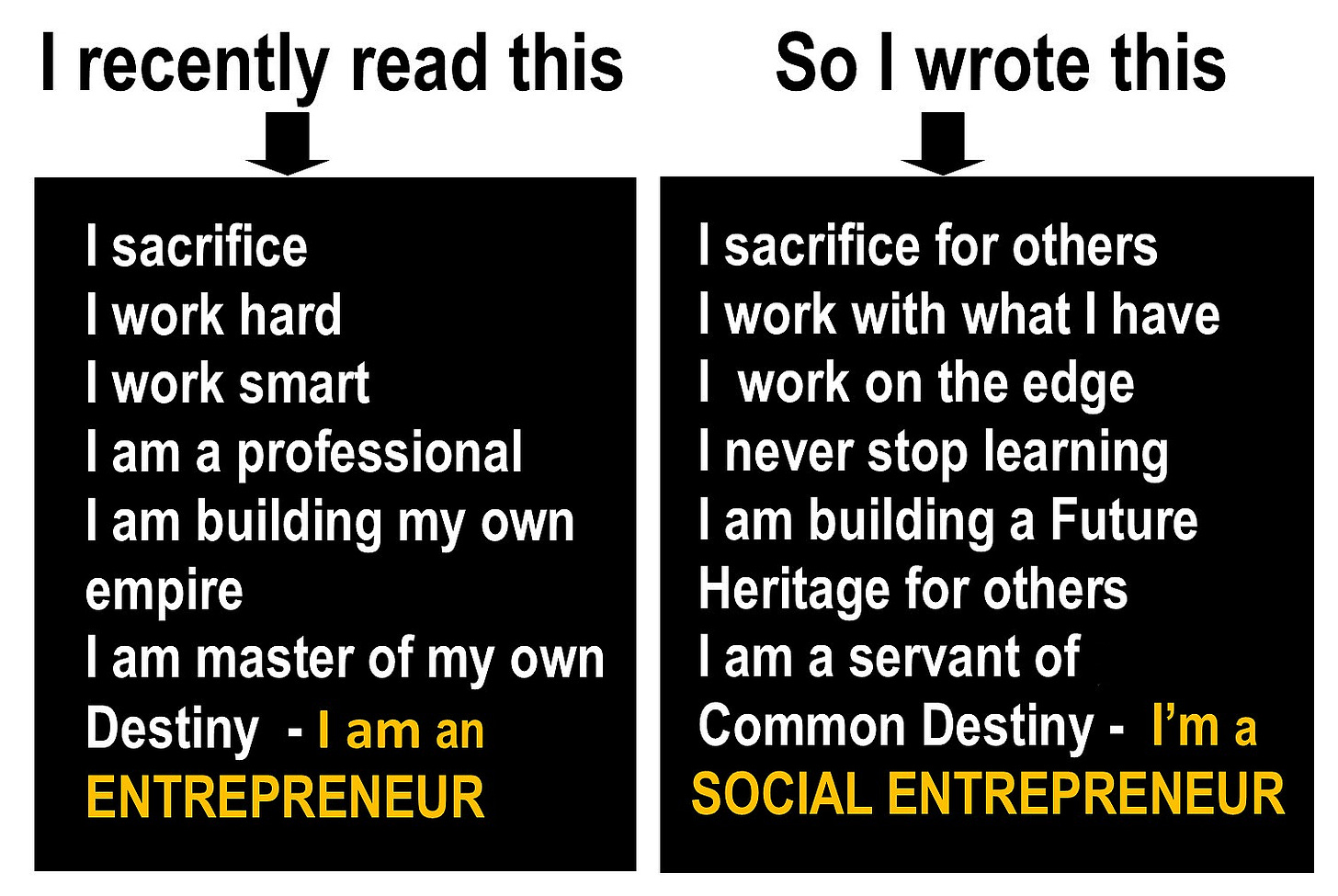Reality Check…!(There's none so blind as those who refuse to see)
Astounding truth that most people don't know - and should.
WARNING:
I should state that some may see this article simply as a “rant” – but if you read it through and consider the facts, you should see that it is actually a voice and a pathway for a majority who are excluded.
This is also the longest single article I have ever written (so pleeeease bear with me as I share this understanding.) It is also the most important one I will ever write for small business, so I respectfully request that you read it “mindfully” - and share. (PS: “A closed mind and a corpse share ONE THING in common - Both listen to reason with equal intent.”) Community Gold Quotes - Bob Neville.
Here’s something about very small business and community sustainability that most people, including most politicians don’t comprehend in terms of its impact. In fact, there are lots of amazing things about business and community that are not known or understood by most people. But YOU CAN know these 16 at least.
1. Where does every business come from?
From the smallest micro-business to the largest Corporations on the Planet, all start as just ONE “seed idea” in the mind of ONE individual and grow from there. In fact, ideas for new business seem as plentiful and diverse as oceanic plankton, microscopic plant and animal life-forms which are foundational to the food chain.
2. There are three generally “recognized” levels of Business - Big, Medium and Small. Nothing new there but think about this:
Big Business - employing 100 or more = less than 0.5 of 1% of businesses. Medium Business - employing 20-99 = around 4% of businesses. Small Business (those employing 5-19 = about 11% of businesses by number.
OK, while all of these levels play an important role in every economy, that’s still only around 15% of businesses – so where’s the rest?
3. There is a fourth level of business which is not so distinctly recognized in its own right but is usually just considered to be part of Small Business.
This fourth level is Micro-Business (those employing from 0-4 people) and it is this level which represents around 85percent of all registered businesses by number. Over 60% of registered Micro-Businesses are owner operated and don’t employ anyone.
4. One of these 4 levels overwhelmingly plays the most critical role in sustaining the social and economic balance, diversity and livability of every community, and that’s Micro-Business.
Why? Not just because it represents on average, around 85 % of all registered businesses, but in most Regional, Rural and Remote communities it actually represents from 95% to as much as 100% of all private sector businesses.
5. Micro-business sustains all levels above in a typical “planktonic” relationship
All larger levels of business “feed” directly or indirectly, from the Micro-economy (the daily productivity and spending of individuals, families and very small businesses and services.) Without Micro-Business, larger business could not exist, as most of what they produce, or supply is ultimately consumed at the micro-economic level.
6. Micro-Business provides most of the diversity of jobs, business and services that make communities livable, and if a community’s micro-business diversity is shrinking, then usually, so too is the community - it’s just that simple.
Also, Micro-business, along with smaller small business, provides most employment and most Tax revenue, while larger small business and in particular medium and large business, can afford to employ other businesses to help them greatly reduce or even eliminate tax commitment.
7. In spite of its critical role in sustaining economy, Micro-Business is the least recognized, the least acknowledged for its true role, the least understood, the least supported and the most exploited.
I get extremely annoyed when Politicians patronizingly refer to this level of business as “mum and dad business.” Its sheer volume, like oceanic plankton, is so large and so constant and so ever-changing that it provides the “platform” for sustaining everything above.
Just like the delicate balance of our natural ecology, its crucial sustaining role is either not understood or simply taken for granted by most people in a world where all that seems to matter is money.
8. Government is constantly rolling out Business Support Programs, but these seem focused on achieving politically expedient outcomes.
These Funding Programs mostly support medium and large businesses and new Industries with ideas that are “business-ready,” cashed-up and which promise to create “many new jobs”. You will usually notice that in any Government Funding for business, the eligibility tests quickly weed out micro and very small businesses - they are not taken seriously.
9. There are NO individually focused government funding initiatives that really help this massive micro-business level representing 85% of all businesses, especially when that help is needed most.
While some Business Incubators offer some support, this is usually in the form of “Information” and “training” Programs that try to convince Micro-Businesses and start-up businesses at this level to become trained “experts at everything” before they start.
It does not work that way in the real world, as MOST people who go into business have a strong aversion towards Training and Planning. Most Micro/Small businesses don’t have a Business Plan and never will and trying to convince them will fall on deaf ears for most. This does not mean we should write them off, but rather, understand the nature of what we are dealing with here and approach it in another way.
Oh yes, let’s not forget that Governments fund Business Incubation Programs, they will be quick to tell you that. However, Incubators are costly to set up and run, needing substantial ongoing funding to continue. Further, Incubators are very selective in whom they support, only picking what they judge to be the best fruit.
Unfortunately, by virtue of their limitations, Incubators can only deal with a small fraction of ideas conceived locally. Again, there needs to be a better way of identifying and evaluating all of the ideas which are conceived.
10. Commercial Business support industries, such as Banks, Finance, Marketing, Independent Business Advisors and Consultants etc., are mostly all competing for top 20% of businesses.
The other 80% is largely regarded as being too risky or uneconomical to deal with and are left to fend for themselves or left to become victims of the “sharks”.
Support at this level is generally given a one-size-fits-all brush stroke or “brush off” - and subtly just tagged as high risk as the commercial Business Support Industries can’t make enough out of them to justify real support. While I understand this is simply a reality of business economics for most of them, again, there needs to be a way of effectively supporting the micro-level – and there is, but I will address that further on.
At this point, let’s go back to my opening question: Where does every business come from?
As I said, every business comes from ONE seed idea from ONE individual and grows from there. However, consider: Who has these ideas? Is it mostly the top academic brains in the business world? Is it the most educated, the most financially stable?
NO, NO, NO…!
11. Most businesses that start-up or ever exist, are started by all kinds of people at every level of the social, economic and environmental status-sphere.
I have identified that every year, there is likely well over 400,000 ideas “conceived” for potential new business and community projects by all kinds of people from all walks of life across Australia, New Zealand and the Pacific Oceanic Islands Region. Yet, most of these ideas NEVER get past the conception stage because many who have them don’t know how to take them further.
Sure, many of these ideas will be “wild seed” but this does not mean they are unworthy of the right kind of due consideration.
Most are either not even identified through traditional business and economic development support, or if they are, they are more often unceremoniously “judged” without credible consideration on the apparent social and economic status of the individuals presenting them or on the mere “opinion” of someone else.
It is rarely possible to accurately judge an idea just by hearing what it is.
Yet, unless the people who have these ideas can show that they already have the skills, expertise, resources, support and connections they need when they present their idea, then most will have a snowflake’s chance in hell of getting any kind of real help from the business support sector.
After all, what self-respecting Economic Development Officer, Business Advisor or Bank Executive would be willing to give a little credible time to someone who has an idea, which at first may seem to be crazy. Especially if the individual has no money and no business experience, is unemployed or walks in smelling like a sewer rat, or perhaps be someone in a wheelchair or someone who has been in prison, literally or mentally?
Very few indeed! They are usually quickly side-lined or directed to Training options.
12. Most people who have an idea for a business and seek help are shunned or patronized unless someone can see a way of making real bucks out of them - but here’s the twist - their collective ideas are actually the heart and soul of every economy.
Yes, these people are quickly, carelessly and indifferently “excluded.” Indeed, why does there seem to be such a lack of inclusiveness?
So what is an “inclusive” community or inclusive society anyway?
My definition:
An Inclusive Community seeks to identify, embrace value and justly consider ALL ideas (for business, Community improvement, Community service, innovation, inventiveness, culture, arts, talent, skills and creative expression) across every dimension of age, culture and human endeavor, regardless of social, economic, cultural, physical or intellectual status.
Hmmm….! How many communities that you know even come near to this definition? It certainly does NOT describe our attitude towards everyday individuals in regard to business inclusion or community social inclusion for that matter. No wonder so many peoples’ lives are empty, unfulfilled, or they feel lost and frustrated and turn to drugs and alcohol and worse…!
Many are not readily welcomed into a society which shuns and excludes them, and which does not enable or support them to identify and nurture and grow that “seed within.” No, our governments seem to believe they should all work for or sell their soul to the “Corporation” and work in “technology” or “construction” or “mining” as a “corporate clone.”
Now, think about this fact:
13. Many regional communities and most small regional, rural and remote communities will NEVER attract big business or Industry or medium business or even larger small business.
Read that again.
And if micro-business continues to decline in those communities because everyone is waiting for big business, Industry, mining or government to save them, then they will continue to decline, not realizing that the real solution is likely already there right under their feet, unless they have left it until it’s too late.
When is it too late...?
“When the productive soil of potential community regeneration has been neglected and abused and polluted for so long that it turns to stone.” This is when a community and its successive leaders have neglected regeneration of its basic “seed opportunities” over a long time, even over generations and nothing can grow there.
Yet, I see so many Councils trying to attract bigger businesses and achieve little or nothing. They don’t consider that there are probably at least a dozen other communities which have more to offer and a dozen other reasons why it is not practical for them to relocate or set up in those communities.
Other Councils attempt to poach businesses from other Regions but poaching a business from one location to another is not planting new seed and creating new wealth – just relocating it. However, greater inclusiveness at the micro-level literally does create the natural miracle of “new wealth.”
14. We are a society which is conditioned to thinking that business is ONLY about creating lots of jobs and making lots of money at the high-end of town.
We fail to consider or include the poor, the disadvantaged, the disabled, the less educated, the less eloquent and less connected of our society. We judge them all in one square box as all being high risk and not worth listening to.
Huge mistake!
· Do you not think that among those 400,000+ ideas that are conceived each year just in my part of the world, there would not be many that could be facilitated to successful start-up business?
· Do you not think that many truly innovative ideas are lost every year among those ideas? And what about if we factor this equation internationally? Unfortunately, our governments have come to believe that the word “innovation” actually means “technology” and big business? Another huge mistake!
· Do you not think that among those 400,000+ ideas there may be many that could generate lots of jobs even with potential to become large Corporations or new Industries? FACT: Many of the biggest corporations in the world started out this way.
· Do you not think that among those 400,000+ ideas (roughly 20 ideas per 1000 population per year) there could not be individuals whose lives would not be changed by having the opportunity to fulfil a dream or passion in their own business? Even if it does not make a huge amount of money yet provided self-employment, increased self-esteem, greater sense of self-worth and purpose in life, is that not more important than the “corporate dollar?”
Consider: “Every human being is a unique individual, deserving the freedom of spirit to understand, express and fulfil the driving creative passions to which we were born. Whether we succeed or fail, nothing allows this freedom of creative expression or stimulates innovation like free enterprise micro/small business.” Bob Neville - Community Gold Quotes
· Do you not think that 100 new micro-businesses which might employ just 20, 30 or more people collectively, in addition to self-employing the owner, provides so much more micro-economic diversity and keeps more dollars locally, is as valuable as one business that employs 50 or 100 and which most likely is taking its profits offshore?
· Do you not think that 100 new micro-businesses, some of which will obviously only last short term, are still not more valuable than one big business, which if it closes, may have a huge, simultaneously devastating impact on the community and even far beyond?
Yes, many bigger businesses fall over too, often with massive economic and social consequences for their employees, sub-contractors, supplier-creditors and their investors. And in the process how many of them simply abort their obligation and the Directors are soon usually free to start the process all over again.
Now, I hasten to make the point that I am in NO WAY playing down the relevant importance of Big Business or Industry and Infrastructure development.
Obviously, they are an essential part of the equation, as long as they are not burdening future generations with more and more debt and as long as it environmentally sound. But the point I am making is that we are totally neglecting and even disadvantaging and exploiting the foundation that holds up our economy, that which provides most diversity, most jobs, most tax revenue and increased livability locally.
So, I will ask my opening question again, slightly differently this time?
Where does every business idea come from? Yes, I know I already said from ONE individual – but at what level of the economy do most of these people exist?
Now this is the clincher…!
This is another truth that most of our politicians just can’t get their head around.
15. There is yet ANOTHER level of economy, a sixth level, below the radar of Micro-economy which plays a different but an arguably equally important role to that of Micro-business.
I call it an “invisible” economy because while it is there staring us in the face, we don’t notice and simply take it for granted. Further, it is similar in size to the 60%+ of non-employing Micro-business.
Get your head around that!
Its role is also truly “planktonic” and very amazing when fully understood from a natural economic science perspective.
The “invisible economy” is cash transaction, unregistered hobby business and barter and it is so active and so diverse that it is largely unable to be fully measured or controlled. Yet, it too has a crucial role in the economic equation - and possibly the most crucial - in that it is the foundation “seedbed” of most ideas, many of which (and many more of which could) feed into the above-ground economy as new Micro-business and larger.
This invisible economy of massive micro-wealth is the true “humus” of economic activity from which most seed-ideas sprout.
Within that warm, rich and highly fertile soil, there are countless new seed ideas conceived every day, just waiting for that right moment in hope of a little water of genuine encouragement and support that might see them emerge from the underground into the life- giving light of real and greater opportunity.
This invisible economy is actually the primary incubation soil for all above-ground “new wealth” generation – the natural economic humus that breeds the “fetus” of seed-ideas and incubates them until they are born as potential new economic activity from which many of them will eventually give birth to fledgling new businesses. Yet, when they do, they often only have their dreams quickly burned off in the heat of the midday sun through lack of the right kind of water of encouragement and support.
Governments might like to restrict this breeding ground of ideas, in the belief that it is diminishing the potential for tax revenue. However, they would actually be discouraging individuals from propagating their seed ideas altogether and the foundation source of business ideas would be greatly inhibited.
To do so would likely progressively have catastrophic effect on the other levels of economy – just as over-removal of plankton and krill from the ocean would progressively destroy a crucial link in the basic food chain of all life forms.
Such thinking (other than in regard to what is truly criminal activity contributing to social challenge) is akin to destroying the productive capacity of the soil which produces food (and by the way, we are doing a great job of achieving that too.)
This seed is there. It is ALWAYS there. But like seeds hidden in the desert sands, you don’t know it until the rains burst it into millions of hectares of multi-faceted jewels of brilliant multi-colours.
And now… the double clincher!
16. That desperately needed water of encouragement and support can now begin to be made available to anyone who has an idea for micro business, or project anywhere - through a tried and tested process that I call Micro-Facilitation.
Micro-Facilitation is a mentoring process totally dedicated to the caring propagation of ideas, at the time of conception, right at that level where “Business Angels fear to tread.”
A point I make here:
“Propagation” precedes “incubation” - and a “seed idea” needs to be tested and propagated before the next step of incubation.
So how can this process be provided to Substack Subscribers and beyond?
1. For those who have an idea for a business or a community project but are unsure if it has potential? Your idea can be freely tested to see if it is worth pursuing further. This can be done in minutes with one of my free support tools. If you then feel it has potential and want to explore further, there are MORE free support articles to guide you.
2. For those who have started a micro-business and may be struggling or simply want to improve, there is also tools, articles and a process to help you look into the “mirror” and get some realistic, positive direction.
STOP PRESS…! A CRUCIAL WARNING AT THIS POINT:
I started my first micro business on April Fools Day 1974, as a young, naive, enthusiastic creative hopeful and I make the same mistake that MOST startups make still today. Simply, I failed to realize that no matter how small your business, no matter how seemingly uncomplicated, you cannot do it all on your own, as you will need to fill your personal capacity gaps. (Read my article titled: “What’s your capacity” along with articles I will post progressively on the importance of finding the “right kind” of help that YOU need.)
For example, if someone is really struggling in a small business, the last thing they need is some “expert” telling them that they need to read a book or do a study course and become and expert at everything. Or another “expert” who has “all the answers” at a “price” you probably can’t afford at the time.
It’s a bit like seeing a toddler fall into a swimming pool and running up to the child with a “book” that will teach it “how to swim!” That’s not the kind of help you need if your business is struggling or in “deep water.”
3. The BEST kind of help you could find is a good Mentor - but one whose is affordable and whose primary interest is in seeing you succeed and who understands exactly what you are going through “right now.”
Hard to find? YES - and while I have been providing this kind of mentorship to micro-business for many years, I am clearly limited by my own time and capacity for online, one-on-one mentoring.
For this reason, I will be increasingly and freely providing some of the basic foundation online support resources free to all Substack subscribers, enough to demonstrate the value of what I have developed through a lifetime of coal-face experience.
If you then become a paid subscriber (a small price to pay for a lifetime of what I call “Community Gold”} you will gain access to much, much more free online support materials, and optional publications and programs that address a much broader spectrum of community social challenge.
My personal mentoring process is founded on Social Entrepreneurship. What does that mean?
So, what am I doing/looking for right now…?
I would truly like to see many small and micro communities establish the support of what I call a “Micro-Facilitator” and over time help many, many people - mentors who are driven by a passion for seeing others succeed in the true spirit of Social Entrepreneurship above. The tools, training and process is ready, but it must start small, from that seed, grow naturally, then spread.
First though, I want to grow solid relationships with people out there who truly “get it.”
If you are an individual or organization with a social entrepreneurial spirit - human beings with “heart” - I would love (right from the start) to have you become part of something potentially much bigger than all of us. Think “BIG” - focus “small,”
Thank you for reading.


